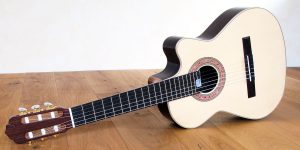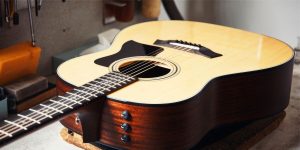Using nylon strings for an electric guitar is not a common practice, and it is more often regarded as an experiment reserved for experienced guitarists seeking to explore new sounds or playing techniques.
In this article, I will share with you the considerations, advantages, and challenges of using nylon strings on an electric guitar, providing insights and guidance for those curious to embark on this unconventional musical journey.
Why can’t you put nylon strings on a regular electric guitar?
Regular electric guitars with standard pickups are designed to pick up the vibrations of steel or nickel-wound strings, which have magnetic properties. Nylon strings, being non-magnetic, will produce a significantly weaker signal or no signal at all. This can result in extremely low output power or no sound when amplified, making the electric guitar almost silent.
Furthermore, nylon strings typically have a wider profile and greater diameter compared to steel strings, which can lead to issues with string height above the fretboard and intonation adjustment. The construction of a standard electric guitar does not accommodate the use of nylon strings, so a guitarist may encounter difficulties adjusting the string height and achieving proper intonation.
Based on my experience, I can claim that an electric guitar with nylon strings requires significant modifications to the instrument and its components, making the process complex and not recommended for novice guitarists or those without experience in working with guitar instruments.
Advantages of nylon strings for electric guitars:

- Versatility in playing styles and musical genres. Nylon strings on electric guitars are well-suited for various playing styles, such as fingerstyle, classical, jazz, and bossa nova.
- Enhanced playability. Nylon strings offer a softer feel and smoother playability compared to steel strings.
- Unique sound qualities. Nylon strings produce a distinct sound characterized by warmth, richness, and a smooth attack. This tone is ideal for creating a gentle and expressive ambiance, particularly suitable for introspective and melodic passages.
- Reduced string noise. Nylon strings generate less string noise when sliding or bending, resulting in a cleaner and more articulate sound.
- Tonality differences. Nylon strings offer a tonal contrast to steel strings, emphasizing the midrange frequencies and providing a more balanced sound.
- Diverse artistic expression. By incorporating nylon strings into an electric guitar setup, musicians can explore new sonic possibilities and expand their creative palette.
While nylon strings may not be the conventional choice for electric guitars, their advantages lie in the distinct tones, enhanced playability, and artistic versatility they bring to the instrument.
How to play nylon strings on electric guitars

There are two ways to play nylon strings on electric guitars:
- Separate piezo pickup. This pickup captures the vibrations of the strings and converts them into an electrical signal. However, it’s important to note that this method is not always ideal, as many of these pickups tend to be of lower quality. When selecting a separate piezo pickup, consider the following factors:
- Quality. Look for reputable brands known for producing high-quality piezo pickups and electric guitars.
- Installation. Determine if the pickup is easy to install or if professional assistance might be required.
- Sound control. Opt for a piezo pickup that offers adjustable tone and volume controls, allowing you to shape the amplified sound to your preference.
- Guitar with a built-in piezo pickup. Another option is to use a guitar that comes with a built-in piezo pickup.
Standard electric guitar vs. piezo electric guitar
Standard electric guitar:
- Sound differences. Standard electric guitars tend to produce a brighter, more focused tone with longer sustain. They are known for their characteristic electric sound, achieved through the use of magnetic pickups and amplifier distortion.
- Musical styles. These instruments are commonly used in genres like rock, blues, jazz, fusion, and more. Their ability to deliver a wide range of tones and the flexibility provided by multiple pickups and coil-splitting options make them well-suited for various musical styles.
- Versatility. They offer immense versatility in tone shaping. With options such as multiple pickups, coil-tapping, and various pickup configurations, they provide a broad range of tonal possibilities, making them suitable for different musical genres and styles.
Piezo electric guitar:
- Sound differences. Such models offer a more balanced acoustic tone with less sustain compared to standard electric guitars. The piezo pickups capture the vibrations of the strings and reproduce a more natural, acoustic-like sound.
- Musical styles. Piezo electric guitars offer a more balanced acoustic tone when paired with nylon strings, making them well-suited for genres such as folk, fingerstyle, and country, where a natural and mellow sound is desired. They excel in delivering a warm and natural tone that complements these styles.
- Versatility. While piezo electric guitars may have limitations compared to standard electric guitars in terms of tonal variety, they excel in providing a distinct acoustic-like tone. Their focus lies in delivering a specific sonic quality, and they are favored in genres that prioritize a more natural and mellow sound.
In summary, standard electric guitars are renowned for their electric sound and versatility, making them suitable for a wide range of musical genres. On the other hand, piezo electric guitars offer a balanced acoustic tone and are well-suited for genres that require a more natural and acoustic sound.














